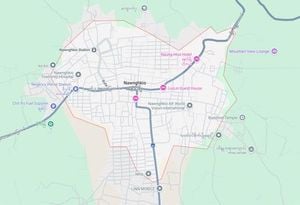Hiroshima Jogakuin University is set to undergo significant management changes as the institution transfers its operations to the YIC Group, which specializes in running vocational schools based out of Yamaguchi City. This decision, made at the end of February 2025, emerges from the university's continuing financial turmoil caused by dwindling student enrollment.
During the board of directors meeting held within the school premises, attendees were united around the necessity of this shift. "This is the only option we had," emphasized the board, highlighting the seriousness of their financial situation. With approximately 780 students currently enrolled at Hiroshima Jogakuin University, the concern over sustaining operations has become increasingly pressing.
The management transfer is officially slated for March 18, 2025, when the application for altering the university's founder will be submitted to the Ministry of Education, Culture, Sports, Science and Technology. The board's unanimous decision reflects both urgency and alignment with the operational outlook of YIC Group, which aims to revitalize the university's offerings.
Despite this transition for higher education, Hiroshima Jogakuin Junior and Senior High School, another entity operated by the Hiroshima Jogakuin school corporation, will continue to function as it has, ensuring stability at the secondary education level within the community.
This partnership with YIC Group is seen as pivotal for the survival of the university, echoing sentiments within the educational sector about the need for adaptability amid changing enrollment landscapes. The agreement between the university’s administration and YIC Group showcases mutual interests and aspirations, aiming to breathe new life and direction for the university.
Local education experts are eyeing this transition closely, speculating on the potential impacts it will have on both the academic programs and the student experience at Hiroshima Jogakuin University. The focus remains on how the YIC Group—a recognized leader within vocational training—will integrate their operational model, directing attention toward student needs and market demands for skills training, which can often lead to higher employment rates for graduates.
Transitioning management, especially for educational institutions, is fraught with challenges but can also present unique opportunities for growth and innovation. Observers are hopeful this decision might mitigate the financial struggles the university has faced over recent years, as educational frameworks continue to evolve due to societal shifts and student preferences.
Moving forward, Hiroshima Jogakuin University aims to clarify its identity and academic mission under the new management, with stakeholders eager to see how this integration will affect faculty recruiting, curriculum development, and resource allocation.
YIC Group, having already established its reputation within vocational education, is expected to bring its expertise to bolster the university’s academic standing, thereby revamping its approach to attract prospective students. Their strategic vision will likely incorporate contemporary learning methodologies and career-focused programs, setting the stage for future success.
Onlookers anticipate tangible changes within the university environment, focusing on how the new management will address current financial constraints and steer the school back toward stabilization and possibly growth. The educational community remains supportive of the initiative, hoping it might inspire other institutions facing similar enrollment challenges.
Even as Hiroshima Jogakuin University pivots to its new management structure, it highlights issues many educational establishments are grappling with today: adapting to the modern educational climate and meeting student needs. Time will tell how effective this transition will be, but initial sentiments suggest hope paired with pragmatism.






